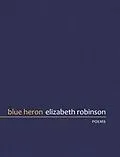The poems in Blue Heron delineate a passage through grief and change. Here, personal loss is continuous with threats to other species and landscapes. In response, Robinson has uprooted the terrain of language, "e;what / bestows itself from / the almost-invisible / and its stain."e; If these uprootings are casualties of a poetics seeking to redress imbalance and "e;pollution,"e; then they are also opportunities to rethink what can exist in the field of poetic language as "e;roots also quicken, bruise their plural pronouns, lose tune, / forsake terrain by moving through and on it."e; And so Blue Heron links poetic process with organic process, presence with the gap we know as hauntedness. The page is not only a resonant physical field, but also a site of dialogue between human and landscape, between lack and manifestation. If these poems constitute a poetics of loss, they are equally a movement toward a poetics of openness, risk, and renewed balance in which poetry shifts as "e;a form of weather, a form/of following, falling from the form/as it twists."e;
